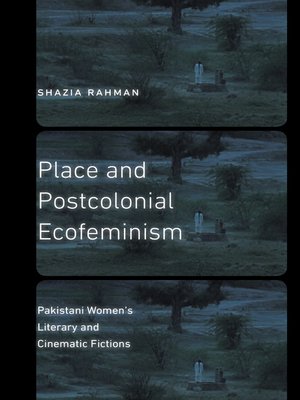Place and Postcolonial Ecofeminism
ebook ∣ Pakistani Women's Literary and Cinematic Fictions · Expanding Frontiers: Interdisciplinary Approaches to Studies of Women, Gender, and Sexuality
By Shazia Rahman

Sign up to save your library
With an OverDrive account, you can save your favorite libraries for at-a-glance information about availability. Find out more about OverDrive accounts.
Find this title in Libby, the library reading app by OverDrive.



Search for a digital library with this title
Title found at these libraries:
| Library Name | Distance |
|---|---|
| Loading... |
While news reports about Pakistan tend to cover Taliban attacks and bombings, and academics focus on security issues, the environment often takes a backseat in media reportage and scholarship. In particular, Pakistani women's attachment to their environment and their environmental concerns are almost always ignored. Shazia Rahman traces the ways in which Pakistani women explore alternative, environmental modes of belonging, examines the vitality of place-based identities within Pakistani culture, and thereby contributes to evolving understandings of Pakistani women—in relation to both their environment and to various discourses of nation and patriarchy.
Through an astute analysis of such works as Sabiha Sumar's Khamosh Pani (2003), Mehreen Jabbar's Ramchand Pakistani (2008), Sorayya Khan's Noor (2006), Uzma Aslam Khan's Trespassing (2003), and Kamila Shamsie's Burnt Shadows (2009), Rahman illuminates how Pakistani women's creative works portray how people live with one another, deal with their environment, and intuit their relationship with the spiritual. She considers how literary and cinematic documentation of place-based identities simultaneously critiques and counters stereotypes of Pakistan as a country of religious nationalism and oppressive patriarchy. Rahman's analysis discloses fresh perspectives for thinking about the relationship between social and environmental justice.
Through an astute analysis of such works as Sabiha Sumar's Khamosh Pani (2003), Mehreen Jabbar's Ramchand Pakistani (2008), Sorayya Khan's Noor (2006), Uzma Aslam Khan's Trespassing (2003), and Kamila Shamsie's Burnt Shadows (2009), Rahman illuminates how Pakistani women's creative works portray how people live with one another, deal with their environment, and intuit their relationship with the spiritual. She considers how literary and cinematic documentation of place-based identities simultaneously critiques and counters stereotypes of Pakistan as a country of religious nationalism and oppressive patriarchy. Rahman's analysis discloses fresh perspectives for thinking about the relationship between social and environmental justice.







